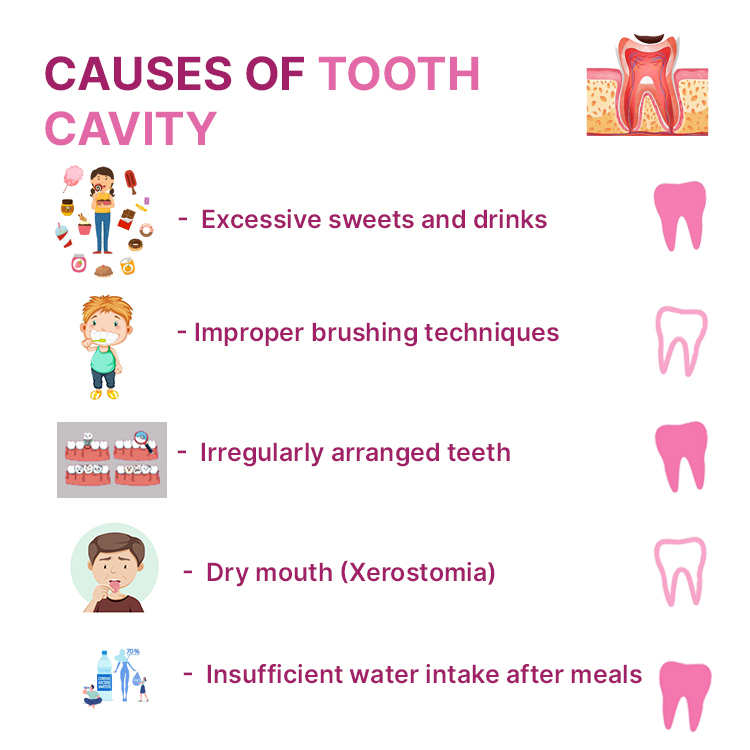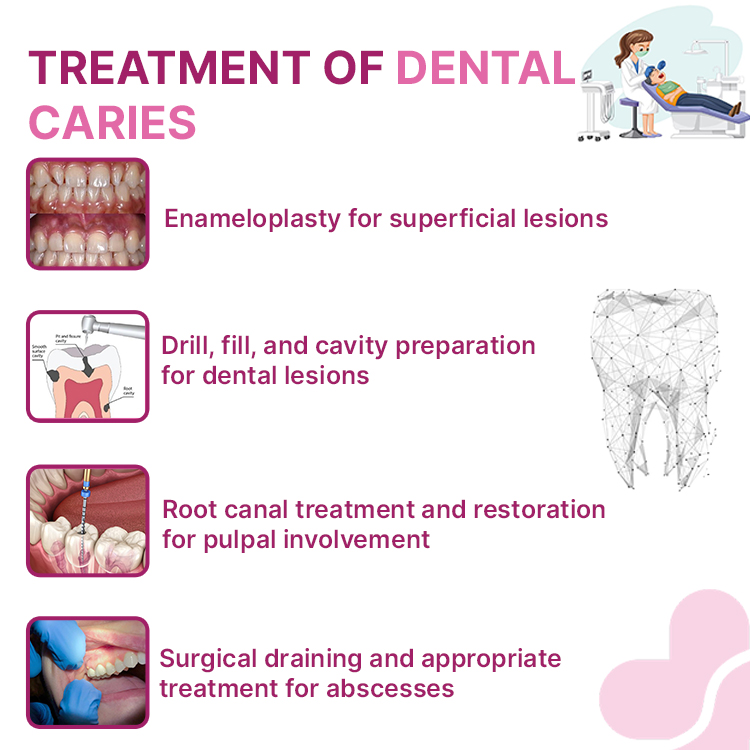Tooth Cavities
May 22, 2023
A survey was taken in a mall about the most daunting fears in one’s life. Many answered, saying “monsters”, “dark rooms”, “high buildings,” and so on. One little boy from the crowd stepped up and said, “My dentist”. A dentist is often portrayed as a very scary person with pliers who pulls one’s teeth out. In reality, a dentist actually helps save our teeth and the structures that support them. We often neglect our oral hygiene, which brings us to the point of tooth extraction. This article aims to create some awareness about how to save our teeth and not lose them after damage has been done
WHAT IS A TOOTH CAVITY?
Dental caries, commonly called tooth decay, results in the formation of a cavity. It is one of the most common global oral health problems today. This occurs due to the activity of certain bacteria, like Streptococcus mutans, found on the tooth surface. The food we eat is broken down into sugar. These bacteria metabolize sugars to produce acid. If bad oral hygiene practices continue for a long period of time, the acid that is produced, slowly starts to break down the tooth structure by demineralizing it. This is how a tooth cavity, or dental caries, occurs
TOOTH CAVITY VERSUS TOOTH DECAY
To understand the disease process, it is important to understand the nomenclature. In simple terms, let us imagine a worker digging the soil to make a pit. The act of digging the soil is a process, and after the process is completed, it results in the formation of a pit. Similarly, this analogy can be used for dental caries. Tooth decay is a process that occurs over a period of time, resulting in the formation of a tooth cavity
COMMON CAUSES OF TOOTH CAVITY

All teeth, right from birth, are covered by a biofilm ( a layer of microorganisms). When disease - causing microorganisms dominate the biofilm formed on the tooth surface, it could result in the breakdown of the tooth structure. A healthy biofilm is regulated by a well balanced pH and the metabolic activity of the microorganisms. When it tips to a more acidic pH, problems arise. Some common causes that alter the pH and cause dental caries are:
-
Excessive consumption of sweet food and beverages
-
Improper brushing techniques
-
Irregularly arranged teeth, making brushing inaccessible
-
Conditions like xerostomia or dry mouth with inadequate saliva ( saliva has a role in maintenance of pH)
-
Inadequate consumption of water after consumption of food
All the above lead to acid attacks by bacteria on the tooth structure. Repeated acid attacks will result in the presence of dental caries
SYMPTOMS OF DENTAL CARIES
It is not easy to ignore something wrong within our mouths. At the same time, one may not show too many symptoms until active tooth destruction has begun. However, some main symptoms are
-
Tooth pain
-
Sensitivity of teeth to sweets, hot or cold
-
If the infection is severe, it can lead to the formation of an abscess containing pus
Abscess formation needs immediate treatment as it can cause facial swelling and even radiating pain through the face. Sometimes this may be even accompanied by fever
STAGES OF DENTAL CARIES
The tooth consists of three layers the outer enamel, the middle dentin layer, and the inner pulp chamber. The enamel layer is highly mineralized and is relatively more difficult to break down compared to the dentin and pulp. The pulp contains nerves, and hence one starts to feel pain as the disease lesion progresses closer to the pulp. During the initial stages of disease, only the outer enamel is affected; sometimes, with intervention, the disease progression can be stopped or even reversed. Once the lesion crosses the dentin layer, it becomes irreversible. The various stages of dental caries are
STAGE 1: Attack by white spots ( reversible stage)
STAGE 2: Enamel decay
STAGE 3: Involvement of dentin
STAGE 4: Involvement of pulp
STAGE 5: Abscess formation
CONSEQUENCES OF DENTAL CARIES
-
Untreated dental caries can cause
-
Breakdown of tooth structure
-
Bad breath
-
Food lodgement in the cavities
-
Tooth pain
-
Loss of tooth and need for rehabilitation
-
Severe conditions cause systemic effects
PREVENTION OF DENTAL CARIES - ORAL HYGIENE PRACTICES
Fluoride is a mineral that can prevent the progression of dental caries
-
Brush teeth with a fluoride toothpaste
-
Drink water that is treated with a titrated amount of fluoride
-
Fluoride mouth rinses may help too
An oral hygiene routine that may help is brushing teeth twice daily and flossing with an interdental cleaning aid. It is important to make smart food choices by limiting foods high in sugar and starches. Do not use tobacco in any form. If you do, please consider quitting. Most importantly, visit your dentist for regular checkups
A Note for Prevention of Early Childhood Caries in Babies:
Regularly clean and sponge your child’s mouth with a washcloth after every feed
What foods are good and bad for your teeth?
Good:
-
Fibre rich fruits and vegetables
-
Cheese, milk, unsweetened yoghurt and other dairy products
-
Green and black tea
-
Sugarless chewing gum
-
Water treated with fluoride
Bad:
-
Sticky candy and sweets
-
Starchy food that gets stuck to your mouth
-
Carbonated soft drinks
-
Alcohol consumption
TREATMENT OF DENTAL CARIES

When you visit a dentist and you are clinically diagnosed with dental caries, your dentist will advise you to get treated. The treatment depends on the extent of the lesion. They will get a radiograph of the involved tooth and decide on treatment accordingly
-
Enameloplasty for superficial lesions
-
Removal of the affected structure and cavity preparation using a drill, followed by filling of the cavity for lesions limited to the dentin
-
Pulpal involvement involves root canal treatment. After this, the pulp chamber is filled, and a cap is placed on the tooth
-
An abscess calls for surgical draining followed by root canal treatment, or whatever your dentist decides according to the clinic scenario
If you are prone to dental caries, talk to your dentist about dental medicines and fluoride varnishes for prevention
CONCLUSION
Conscious eating, good oral hygiene practices, and regular visits to your dentist for checkups will help you identify any problem at an early stage, thus warranting a conservative approach
Recent Post

Why Should You Book Lab Tests Online?
_(1)_CAT_1640504567.jpg)
ஸ்மார்ட் போன்களால் ஏற்படும் பிரச்சனைகள்

Type 2 Diabetes Mellitus

Type 1 Diabetes Mellitus

Summer Skincare Routines and Sunscreen Recommendations

நமது வாழ்க்கையில் இன்சுலினின் பங்கு

Raising Happy and Healthy Kids!!!

Order Medicine Online in Chennai at Your Fingertips

Online Pharmacy in Chennai
_CAT_1627035020.jpg)
குளிர்காலத்தில் இதயத்தை ஆரோக்கியமாக வைத்துக்கொள்வது எப்படி?

_CAT_1684759383.jpg)